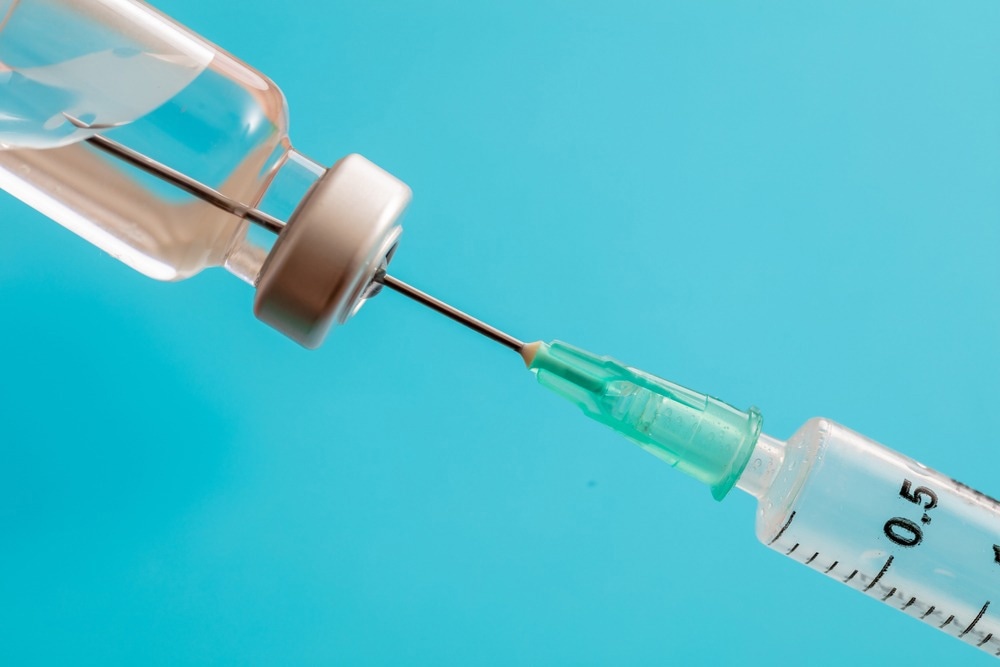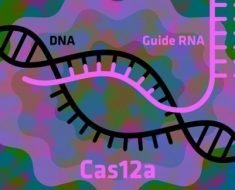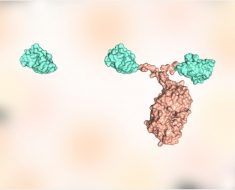In a recent study posted to the medRxiv* preprint server, researchers evaluated the safety and immunogenicity of coronavirus disease 2019 (COVID-19) vaccines against severe acute respiratory syndrome coronavirus 2 (SARS-CoV-2) variants of concern (VOCs).

Background
COVID-19 vaccine-induced immune protection wanes with time, an issue compounded by the continual emergence of SARS-CoV-2 variants. Booster doses of existing vaccines, directed against the SARS-CoV-2 spike (S) protein of the prototype Wuhan-Hu-1 strain, could enhance short-term vaccine effectiveness (VE); however, variant-specific SARS-CoV-2 vaccines would be required for durable immune protection against SARS-CoV-2 VOCs.
About the study
In the present preliminary analysis or first stage of phase 2 randomized clinical trial, researchers evaluated Moderna vaccines containing messenger ribonucleic acid (mRNA) encoding the S protein of several SARS-CoV-2 strains to assess the breadth, magnitude, and durability of early antibody responses to second booster vaccination against SARS-CoV-2.
The analysis was performed between 30 March and 6 May 2022 across 22 sites in the United States (US) and enrolled healthy adults who had received primary SARS-CoV-2 vaccinations and one booster vaccination. For all eligible patients, prior SARS-CoV-2 infection and the last vaccination dose were ≥16 weeks before the randomization process. Previous SARS-CoV-2 infections were considered if the diagnosis was based on antigen tests, polymerase chain reaction (PCR) tests, or the presence of antibodies against the SARS-CoV-2 nucleocapsid (N) protein up to 27 June 2022 (data cut-off).
The study participants were randomized to receive one of six Moderna COVID-19 mRNA vaccine arms (50µg dose): prototype or mRNA-1273, Omicron BA.1+Beta (single/double dose), Omicron BA.1+Delta, Omicron BA.1 monovalent, and Omicron BA.1+Prototype. SARS-CoV-2 neutralization titers were assessed. In addition, a randomly selected subset (20 to 24 samples per vaccine arm) was analyzed for Omicron BA.2.12.1 and BA.4/BA.5 sublineage neutralization.
Pseudotyped lentivirus assays were performed with SARS-CoV-2 S mutations in D614G, Delta, Beta, Omicron BA.1, Omicron BA.2.12.1, and Omicron BA.4/BA.5 strains after 15 days of vaccination to determine the neutralization titers, expressed as ID50 (serum inhibitory dilution required for 50% neutralization) values. Electrochemiluminescence immunoassays were used for measuring baseline anti-SARS-CoV-2 N titers.
Additionally, antigenic cartography analysis was performed, and antibody landscapes were assessed. The systemic solicited adverse events (AEs) were noted for one-week post-vaccination, and unsolicited AEs were reported till day 29. Serious adverse events (SAEs), medically attended adverse events (MAAEs), and adverse events of special interest (AESIs) observed in the trial were noted.
Results
A total of 597 vaccinated participants were randomized, the median age of whom was 53 years, most of them (53%) were women, and 20% had prior COVID-19 history. All mRNA vaccines were found well-tolerated and safe. Baseline and Day 15 geometric mean titers (GMT) were similar between older (≥ 65 years) and younger adult individuals in all vaccine arms but two-fold to three-fold higher among individuals with prior SARS-CoV-2 infections.
Day 15 GMTs against the D614G strain were similar across vaccine arms and age groups and higher among those with prior SARS-CoV-2 infections. Among the uninfected study participants, Day 15 Omicron BA.1 GMTs for all Omicron-containing vaccine arms were similar (3724-4561) and were higher than those for the prototype (1,997).
The Omicron BA.1+Prototype vaccine and the Omicron BA.1 monovalent vaccine induced geometric mean ratios (GMR) to prototype for Omicron BA.1 of 1.6 and 2.0, respectively. The Omicron BA.4/BA.5 neutralizing GMTs on day 15 were one-third of those of Omicron BA.1. GMTs for prototype, Omicron BA.1+Beta, Omicron BA.1+Delta, and Omicron BA.1+Prototype were 517, 628, 765 and 635, respectively.
For uninfected participants, all vaccine arms had identical pre-vaccination antigenic landscapes, apexed over the D614G strain. Post-vaccination, all arms had higher antibody titers with flattening of the antigenic landscape observed. The second dose of COVID-19 mRNA booster vaccination raised antibody titers among uninfected participants such that the titers were similar to those observed among participants with previous SARS-CoV-2 infections. The largest increase was noted for anti-Omicron BA.1 titers by Omicron-containing mRNA vaccines. In the subset analysis, the Omicron BA.1 + prototype and Omicron BA.1 + Delta mRNA vaccines elicited the highest titers; however, Omicron BA.1 + Beta vaccines flattened the antigenic landscapes the most.
Solicited AEs post mRNA vaccination were similar to those observed in previous booster vaccination trials and did not substantially differ between the vaccine arms. Injection-site pain (83%) was the most common solicited local AE, and the most frequently reported solicited systemic AEs were myalgia (58%) and fatigue (67%). Importantly, most solicited AEs were mild (47%) or moderate (43%), and only 4% were severe. In addition, 65 breakthrough SARS-CoV-2 infections were reported after randomization; however, none required hospital admissions.
Overall, the study findings showed greater titers against Omicron BA.1 with the administration of Omicron-containing mRNA vaccines compared to the prototype mRNA vaccine and the anti- Omicron BA.4/BA.5 titers were lower than the anti-Omicron BA.1 titers for all the candidate COVID-19 vaccines. The findings indicate greater immunogenicity of strain-specific SARS-CoV-2 vaccines compared to prototype vaccines, warranting the need for updating COVID-19 vaccines.
*Important notice
medRxiv bioRxiv publishes preliminary scientific reports that are not peer-reviewed and, therefore, should not be regarded as conclusive, guide clinical practice/health-related behavior, or treated as established information.
- Branche, A. et al. (2022) "SARS-CoV-2 Variant Vaccine Boosters Trial: Preliminary Analyses". medRxiv. doi: 10.1101/2022.07.12.22277336. https://www.medrxiv.org/content/10.1101/2022.07.12.22277336v1
Posted in: Medical Science News | Medical Research News | Disease/Infection News
Tags: Antibodies, Antibody, Antigen, Clinical Trial, Coronavirus, Coronavirus Disease COVID-19, covid-19, Fatigue, Hospital, Immunoassays, Lentivirus, Omicron, Pain, Polymerase, Polymerase Chain Reaction, Protein, Respiratory, Ribonucleic Acid, SARS, SARS-CoV-2, Severe Acute Respiratory, Severe Acute Respiratory Syndrome, Spike Protein, Syndrome, Vaccine

Written by
Pooja Toshniwal Paharia
Dr. based clinical-radiological diagnosis and management of oral lesions and conditions and associated maxillofacial disorders.
Source: Read Full Article





